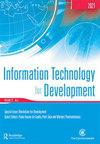信息和通信技术促进发展(ICT4D)评论
IF 5.1
3区 管理学
Q1 DEVELOPMENT STUDIES
引用次数: 15
摘要
摘要本文重构了对信息通信技术促进发展(ICT4D/ICTD)研究和实践的批评要点。由于ICT4D/ICTD既是一种发展工作,也是一个学术研究领域,因此发表了许多关于其规范、理论、方法和后果的批判性思考。本文首次对作者所称的ICT4D批判进行了全面的汇编和综合。作者叙述了对ICT4D研究的运作方式、所谓的理论薄弱和缺乏质量、研究差距以及ICT4D的政治性的批评。他们还对ICT4D实践的新自由主义取向、缺乏以用户为中心的项目、欧洲中心主义和技术乐观主义以及该领域缺乏伦理反思提出了批评。本文旨在为学生、研究人员和从业者,特别是那些新进入该领域的人提供参考和参考。本文章由计算机程序翻译,如有差异,请以英文原文为准。
Information and Communication Technologies for Development (ICT4D) critique
ABSTRACT This paper reconstructs the major points of criticism of both research and practice of Information and Communication Technologies for/and Development (ICT4D/ICTD). Since ICT4D/ICTD was established both as a stream in development work and as an academic field of study, numerous critical reflections on its norms, theories, methods, and consequences were published. This paper provides a first comprehensive compilation and synthesis of what the authors term ICT4D critique. The authors recount criticism about the modus operandi of ICT4D research, the alleged weakness of theories and lack of quality, research gaps, and the politics of ICT4D research. They further recite criticism of the neoliberal orientation of ICT4D practice, the lack of user-centric projects, Eurocentrism and techno-optimism, and the lack of ethical reflection in the field. This paper is intended to serve as a resource and point of reference for students, researchers, and practitioners, in particular those who are new to the field.
求助全文
通过发布文献求助,成功后即可免费获取论文全文。
去求助
来源期刊

Information Technology for Development
Multiple-
CiteScore
11.30
自引率
16.70%
发文量
34
期刊介绍:
Information Technology for Development , with an established record for publishing quality research and influencing practice, is the first journal to have explicitly addressed global information technology issues and opportunities. It publishes social and technical research on the effects of Information Technology (IT) on economic, social and human development. The objective of the Journal is to provide a forum for policy-makers, practitioners, and academics to discuss strategies and best practices, tools and techniques for ascertaining the effects of IT infrastructures in government, civil societies and the private sector, and theories and frameworks that explain the effects of IT on development. The concept of development relates to social, economic and human outcomes from the implementation of Information and Communication Technology (ICT) tools, technologies, and infrastructures. In addition to being a valuable publication in the field of information systems, Information Technology for Development is also cited in fields such as public administration, economics, and international development and business, and has a particularly large readership in international agencies connected to the Commonwealth Secretariat, United Nations, and World Bank.
 求助内容:
求助内容: 应助结果提醒方式:
应助结果提醒方式:


